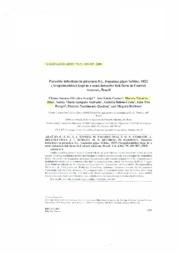Parasitic infections in pirarucu fry, Arapaima gigas Schinz, 1822 (Arapaimatidae) kept in a semi-intensive fish farm in Central Amazon, Brazil.
Parasitic infections in pirarucu fry, Arapaima gigas Schinz, 1822 (Arapaimatidae) kept in a semi-intensive fish farm in Central Amazon, Brazil.
Author(s): ARAÚJO, C. S. O.; GOMES, A. L.; TAVARES-DIAS, M.; ANDRADE, S. M. S.; BELEM-COSTA, A.; BORGES, J. T.; QUEIROZ, M. N.; BARBOSA, M.
Summary: Studies regarding parasite fauna in farmed fish are of great relevance to lhe knowledge of the parasites species. allowing interference in their proliferation in order to avoid epizooties and consequently. economical losses, This study was designed to investigate the prevalence and intensity of parasites in fry Arapaima gigas maintained in ponds of a semi-intensive fish farm in Amazonas State, Brazil. On necropsy, 96,0% of A. gigas were found parasitized by Dawestrema cycloancistrioides. Dawestrema cycloancistrioides (Monogenoidea). Trichodina sp., Ichthyobodo sp. (Protozoa). Camallamus tridentatus, Terranova serrata, Goezia spinulosa (Nematoda) and Argulidae. However, D. cycloancistrium. D, cycloancistrioides and Trichodina fariai were the parasites of' greatest intensity. This study is the first to report parasitic infections in farmed A. gigas and the results indicated a high rate of infection that might lead to important changes in the health of the hosts.
Publication year: 2009
Types of publication: Journal article
Unit: Embrapa Amapá
Keywords: Arapaima gigas, Infecção, Parasito, Pirarucu, Produção Vegetal
Observation
Some of Embrapa's publications are published as ePub files. To read them, use or download one of the following free software options to your computer or mobile device. Android: Google Play Books; IOS: iBooks; Windows and Linux: Calibre.
Access other publications
Access the Agricultural Research Database (BDPA) to consult Embrapa's full library collection and records.
Visit Embrapa Bookstore to purchase books and other publications sold by Embrapa.

